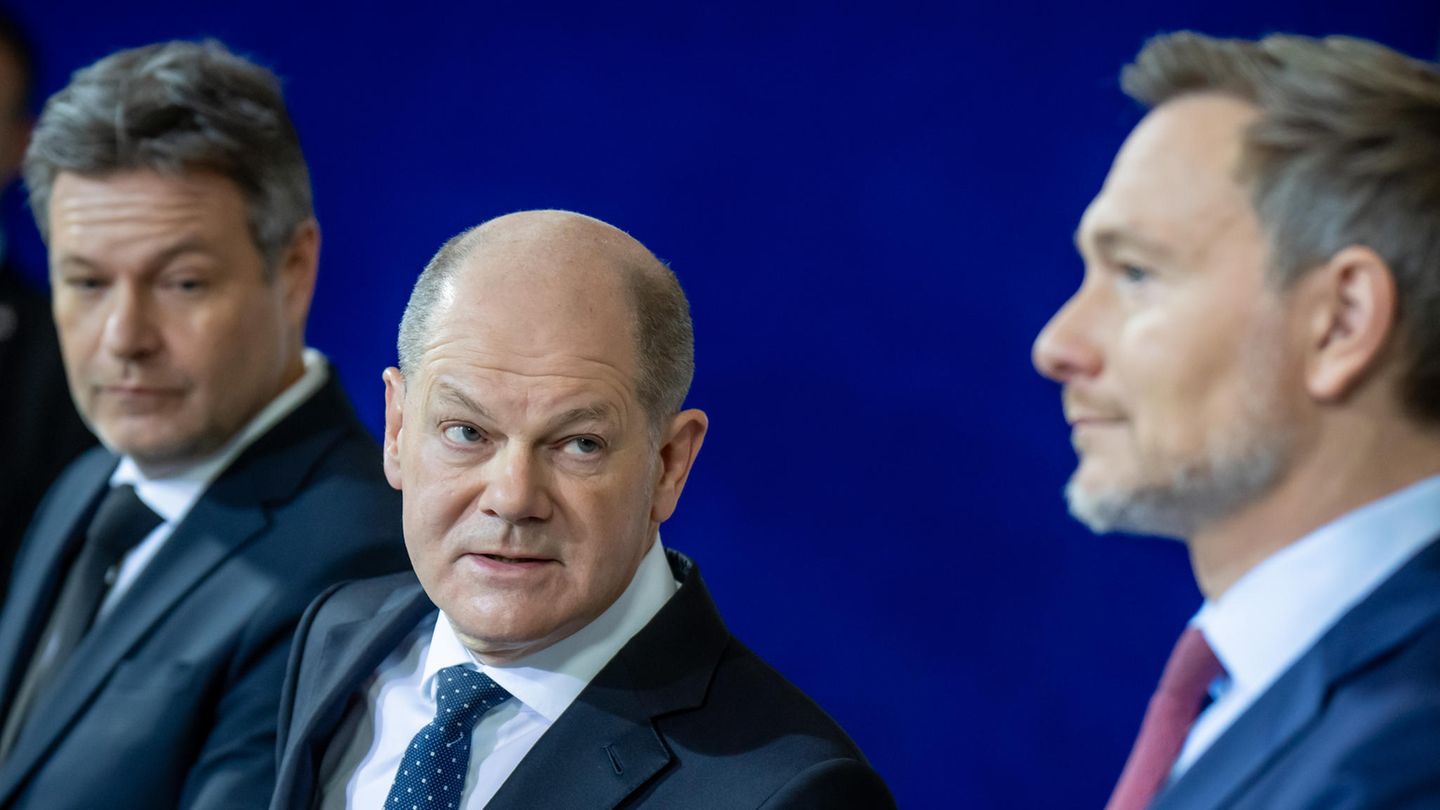After traffic lights go off
That is the question of trust and that is how it works in the Bundestag
Copy the current link
After the traffic light coalition ended, Olaf Scholz asked for a vote of confidence. The Basic Law does not provide for automatic new elections, but there is still a way to get there.
Last Thursday, Chancellor Olaf Scholz asked Bundestag President Bärbel Bas (SPD) for Parliament to express its confidence in him. The Bundestag is scheduled to vote on this this Monday. Failure in the vote of confidence is an opportunity for the Chancellor to bring about an early federal election himself.
“Chancellor majority”
It is certain that Scholz will lose the vote – as expected. Even if there is an uncertainty factor. The Bundestag has 733 members. In order to gain parliament’s trust, Scholz would have to receive 367 votes – the absolute majority or the so-called “Chancellor’s majority”.
The SPD parliamentary group with its 207 MPs wants to express its confidence in the Chancellor. The Greens, the SPD’s junior partner still in government, have not yet made a decision. Her parliamentary group leader Britta Haßelmann announced shortly after the traffic lights went out that the Greens would also vote for Scholz. There is now also talk of abstention.
The traffic light coalition made up of the SPD, Greens and FDP had previously failed after almost three years in office. Chancellor Olaf Scholz fired Finance Minister Christian Lindner and linked this to serious allegations against the FDP leader. “He broke my trust too often,” said Scholz. The Chancellor wants to ask for a vote of confidence and thus bring about early elections.
In contrast to other parliaments in the world, there is practically only one way for the German Bundestag to dissolve in the middle of the legislative period: if the Chancellor asks the parliament a vote of confidence and does not receive a majority in the vote. Then, as the Basic Law states, “the Federal President can dissolve the Bundestag on the proposal of the Federal Chancellor.” In the history of the Federal Republic, some chancellors and their parties have taken this path in order to emerge stronger from new elections. But now, according to surveys, the SPD, Greens and FDP have to fear severe losses in a federal election.
Question of trust is the path to new elections
The Chancellor, the Bundestag and the Federal President can only initiate new elections together through a vote of confidence. At the beginning of a legislative period or if the position of chancellor is vacant for other reasons, the Federal President can also dissolve parliament if a newly elected candidate for chancellor does not find an absolute majority there despite repeated attempts.
The constitution does not provide for a self-dissolution of the Bundestag, nor does it provide for a dissolution by the Federal Chancellor or the Federal President alone. In 1949, the fathers and mothers of the Basic Law drew conclusions from the unstable conditions of the Weimar Republic (1918 to 1933). These and other regulations were intended to prevent frequent new elections, changes of government and blockades from making the country ungovernable. Instead, the popularly elected parliament and the government that emerged from it should be required to pull themselves together until the end of the four-year legislative period. The current Bundestag should actually be re-elected on September 28, 2025.
Or just swap the chancellor?
The Basic Law enables a change of government without a new parliamentary election through a so-called constructive vote of no confidence: A chancellor and his government can only be overthrown if the Bundestag elects a new chancellor with an absolute majority. Without such a constructive step, Parliament cannot formally express no confidence in the government. The Federal President alone cannot replace the Chancellor. This is also a lesson from the stalemate in the Weimar Republic, which paved the way to Adolf Hitler’s National Socialist dictatorship.
In German history, chancellors have asked the question of confidence five times, i.e. the “request” to “express confidence” in them, as Article 68 of the Basic Law states. Only in two cases did the incumbents intend to secure the support of the parliamentary majority, as was originally intended: In 1982, Helmut Schmidt (SPD) had their vote of confidence expressed in a coalition crisis – which did not prevent Schmidt from being elected in the same year a constructive vote of no confidence in the Bundestag was replaced by Helmut Kohl (CDU). In 2001, Gerhard Schröder (SPD) secured approval for the Bundeswehr’s controversial Afghanistan mission by linking this vote to a vote of confidence.
In the three remaining cases, the chancellors used the vote of confidence as a ploy to bring about new elections: it was previously agreed that Willy Brandt (SPD) in 1972, Helmut Kohl (CDU), who had just come into office in 1982, and Gerhard Schröder (SPD) in 2005 lost confidence votes. All three politicians acted in the hope of stabilizing their coalition through new elections. While Brandt and Kohl succeeded, Schröder failed: the SPD lost the federal election and became a junior partner in a grand coalition led by Angela Merkel (CDU). Although the respective federal presidents played along, the so-called “fake questions of trust” were criticized as an abuse of the Basic Law. But they ultimately received the blessing of the Federal Constitutional Court.
Jörn Poltz, Reuters / DPA / wue / km
Source: Stern
I have been working in the news industry for over 6 years, first as a reporter and now as an editor. I have covered politics extensively, and my work has appeared in major newspapers and online news outlets around the world. In addition to my writing, I also contribute regularly to 24 Hours World.




